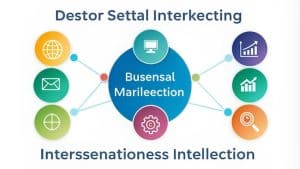Establishing Effective Communication
When it comes to managing a workforce, communication is key. This rings especially true when working with teams spread across different locations. Businesses have found that implementing robust communication tools can significantly enhance productivity and collaboration. For instance, many companies now utilise Slack for instant messaging, Microsoft Teams for video conferencing, and Zoom for virtual meetings.
Regular updates and check-ins have become essential in maintaining a cohesive team structure. By setting clear expectations and goals, companies ensure that everyone is on the same page, regardless of their physical location. However, it’s worth noting that language barriers can sometimes pose a challenge. To address this, some organisations have found success in offering language courses or partnering with translation services to facilitate smoother communication.
Take the case of a UK-based marketing firm that outsourced its administrative tasks to a team in the Philippines. By implementing a structured communication plan and utilising various digital tools, they were able to streamline their processes and improve overall efficiency. The outsourced team handled tasks such as data entry, appointment scheduling, and email management, allowing the in-house staff to focus on core business activities.
Creating an Inclusive Environment
fostering an inclusive environment is crucial for team cohesion and productivity. Many forward-thinking companies have implemented cultural sensitivity training programmes to help their staff better understand and appreciate diverse perspectives. Celebrating foreign holidays and acknowledging cultural differences can go a long way in making outsourced staff feel valued and respected.
Virtual team-building activities have become increasingly popular as a means of strengthening bonds between team members. Online quiz nights, virtual escape rooms, and digital coffee breaks are just a few examples of how companies are bridging the distance gap. Integrating outsourced staff into company-wide events further reinforces the sense of belonging and unity within the organisation.
A London-based tech startup found that by creating an inclusive environment for their outsourced customer service team in India, they were able to significantly improve customer satisfaction rates. The outsourced team felt more connected to the company’s mission and values, leading to better performance and lower turnover rates.
Recognition and Reward Systems
Implementing a global recognition programme can be a powerful tool in motivating and retaining talent, regardless of their location. Performance-based incentives, when applied fairly across all team members, can drive productivity and foster a sense of healthy competition. Celebrating team and individual achievements, whether big or small, helps create a positive work culture and boosts morale.
It’s important to note that rewards should be tailored to cultural preferences. What might be considered a desirable reward in one culture may not hold the same value in another. By taking the time to understand these nuances, companies can ensure their recognition efforts are truly appreciated by all team members.
An example of this can be seen in a British manufacturing company that outsourced its payroll processing to a team in Malaysia. By implementing a culturally sensitive reward system, they saw a marked improvement in accuracy and efficiency. The outsourced team felt valued and motivated, leading to fewer errors and faster processing times.
Fostering Professional Growth
Providing opportunities for professional growth is crucial in retaining top talent, whether they’re in-house or outsourced. Many companies are now offering access to online training platforms, allowing staff to upskill at their own pace. Mentorship programmes that span across borders can provide valuable guidance and support to outsourced team members.
Developing career progression plans for outsourced staff demonstrates a long-term commitment to their growth within the organisation. Cross-functional project opportunities can also broaden their skill set and increase their value to the company.
A UK-based financial services firm found that by investing in the professional development of their outsourced accounting team in South Africa, they were able to handle more complex tasks and take on additional responsibilities. This not only improved the quality of work but also reduced the workload on the in-house team, allowing them to focus on strategic financial planning.
Leveraging Technology for Collaboration
Cloud-based project management tools have revolutionised the way teams collaborate across different time zones and locations. Platforms like Trello for task tracking, Asana for team coordination, and Basecamp for file sharing have become indispensable for many organisations.
Real-time data sharing platforms ensure that all team members have access to the most up-to-date information, regardless of their location. Virtual whiteboarding tools have made brainstorming sessions more inclusive and productive, allowing ideas to flow freely even in a remote setting.
Time zone management software has also proven invaluable in coordinating schedules and ensuring that meetings are set at convenient times for all participants. This consideration goes a long way in making outsourced team members feel respected and valued.
A British e-commerce company found that by leveraging these technological tools, they were able to seamlessly integrate their outsourced customer support team in the Philippines with their in-house operations. This led to faster response times, improved customer satisfaction, and more efficient problem-solving.
Encouraging Open Dialogue
fostering an environment of open communication is crucial for building trust and addressing issues promptly. Many companies have implemented anonymous feedback channels to encourage honest opinions without fear of repercussions. Regular pulse surveys provide valuable insights into team morale and areas for improvement.
Virtual suggestion boxes offer a platform for innovative ideas from all levels of the organisation. Cross-cultural communication workshops can help bridge any gaps in understanding and promote more effective interactions between team members from different backgrounds.
A UK-based IT consultancy firm implemented these open dialogue strategies with their outsourced software development team in India. As a result, they saw an increase in innovative solutions, improved code quality, and better alignment with project goals. The outsourced team felt more empowered to share their ideas and concerns, leading to a more collaborative and productive working relationship.
Ensuring Cultural Alignment
Aligning company culture across borders can be challenging, but it’s essential for creating a cohesive workforce. Many organisations are now emphasising company values during the recruitment process, ensuring that new hires, whether in-house or outsourced, are a good fit for the company culture.
Incorporating culture-fit assessments in the hiring process can help identify candidates who are likely to thrive within the organisation’s environment. Comprehensive onboarding programmes that focus on company culture can help new team members understand and embody the organisation’s values from day one.
Regular reinforcement of the organisational purpose and mission helps keep all team members aligned and motivated towards common goals. This is particularly important when working with outsourced staff who may not have daily interactions with the core team.
A British marketing agency found that by ensuring cultural alignment with their outsourced graphic design team in Eastern Europe, they were able to produce more cohesive and on-brand materials. The outsourced team had a better understanding of the company’s aesthetic and values, resulting in fewer revisions and faster turnaround times.
In conclusion, managing a diverse workforce across different locations requires thoughtful strategies and a commitment to inclusivity. By implementing these approaches, companies can create a unified team that delivers exceptional results, regardless of geographical boundaries. The benefits of outsourcing, when managed effectively, can lead to increased efficiency, access to specialised skills, and cost savings, allowing businesses to focus on their core competencies and drive growth.






